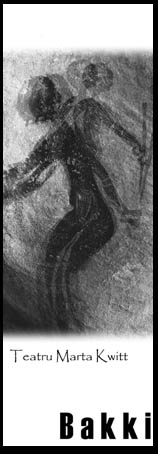BAKKI
A performance synopsis
The
pharmakon: the microscopic fragment of something that alters
perception, changes the course of action, takes the body beyond the bounds
of the merely human.
There
is a long tradition in the history of humanity, one which goes further
back than the time of the Greeks. The latter had their cult of Dionysius,
the god who was capable of catalysing the slippage away from reality.
Euripedes’ Maenads are, perhaps, simply an early recorded instance of a
wider tendency: the tendency to seek abandon in a crowd manifestation in
honour of someone or something. We could say that the initial longing for
something like this is a position of lack: when we speak of diversion,
in all its forms, from entertainment to debauchery, that is perhaps the
starting point, the original state which instills this longing. After
that, the destination is the sheer chaos of forgetting: forgetting
oneself, the limits of one’s body; becoming something else altogether.
Somewhere in between there must be the point of catalysis, the pharmakon,
an other presence that begins the process.
Bakki
began to be conceived as some way of approaching this tradition.
Typically, the Dionysian manifests itself in a crowd, led by the god
himself, whether he be under the guise of a DJ, a politician speaking at a
mass rally, a commentator generating excitement in the crowd at a football
match. The intoxication begins, whether it is caused by a few micrograms
of ecstasy, or something else. This is what this performance aims to
achieve: a mapping form one state to an other state, a path from the
mundane to the excessive, where the “human” becomes a question unto
itself.
It’s
difficult to say whether the performance is a tragedy, in the way
Euripedes’ The Bacchae is, or
whether it is something else... a comic juxtaposition perhaps.
The
theme has been explored through a newly devised training regimen, starting
in March, 2000, which involved vigorous rhythms, sometimes verging on the
violent, coupled with elaborate footwork and voice-work, as well as
subsequent work on the paradoxical tempo of slowness. Music is also an
important ingredient, and the music in this performance is primal.
This
is a performance that takes the performers off the ground. This is a theme
which elevates humanity, or, perhaps, changes the concept of humanity the
way we conceive it.
Teatru
Marta Kwitt is composed of Immanuel Mifsud, director and four performers:
Romina Cachia, Albert Gatt, Ann Marie Spiteri and Daniela Vella. All the
performers have different backgrounds that include Butoh, Northern Chinese
Martial Arts, Contact Dance and Spanish dancing. The aim of the training
process is to give these different individuals a common ground from which
they can embark on the journey towards physical expression.
Bakki will be launched in Malta and will then be presented at Sarajevo 2001 in July.
